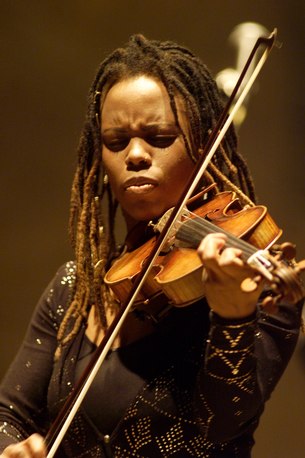Music Review: Regina Carter — A Genius Comes to Rockport
With Reverse Thread, Regina Carter moves beyond conventional boundaries, her music a rich blend of jazz and world music—a cross-cultural exploration of modern and traditional music that expands the boundaries of both genres.
Regina Carter. At the Shalin Liu Performance Center, September 24. Her album is Reverse Thread (E1 Entertainment). Carter will be performing in New England in November (November 17 in Hartford CT, November 18 in Burlington, VT, and on November 25 and 26 in Cambridge, MA). Check her website for venues and times.
By Jim Ball.
Regina Carter is a “genius”—a MacArthur Foundation Fellow who received one of the organization’s touted “genius” grants in 2006. An acclaimed jazz violinist who has plumbed repertoire from swing to standards to Motown (she hails from Detroit, after all), Carter recently presented her latest project, Reverse Thread, at Rockport Music’s Shalin Liu Performance Center. The performance was a stop on an international tour.
Her CD, and the work that led to it, was largely made possible by the MacArthur grant. Carter used some of her funding to study at the World Music Institute in New York City, and there she discovered a wealth of material from Africa that spoke to her as an African-American. While Carter has displayed a wide-ranging mix of styles throughout her career, this album (and the Rockport concert) represents a rich blend of jazz and world music—a cross-cultural exploration of modern and traditional music that expands the boundaries of both genres.
Her Rockport concert featured three of the musicians who are the backbone of the CD: the agile bassist Chris Lightcap; drummer Alvester Garnett; accordionist Will Holshouser; and Malian kora player Yacouba Sissoko. (Brief informational digression here: a kora is a 21-stringed instrument from West Africa, consisting of a large calabash gourd with a long neck and a bridge over which the strings—most often made of fishing wire—are strung. The instrument is tuned by a series of leather tuning rings that run up the neck and is played only with the thumb and fore finger of each hand. It produces a sound resembling a cross between a harp or lute and a delta blues guitar). Sissoko is a kora master from a long line of master players; Carter says he is one of the only kora musicians capable of tuning the instrument so he can play in any Western scale and key (and claims he can tune his 21 strings more quickly than she can tune her violin).
Carter’s Rockport concert included most of the music on the CD, encompassing a soulful and meaningful trip across Africa, from Mali to Uganda to Madagascar. The playful “Hiwumbe Awumba” and the resonant “Mwana Talitambula” are taken from field recordings of the Ugandan Abayudaya, a community in eastern Uganda that practices Judaism, although they are neither genetically or historically Jewish. The former piece is a joyful, dancing tune that shows off Carter and accordionist Holshouser’s repartee to great effect (the recording includes guitarist Adam Rogers, who is evidently not touring with her). “Mwana Talitambula” creates the opposite effect —a simple and slow melody that features some positively haunting accordion sounds from Holshauer.
“Full Time,” the second cut on the CD, is a tune by self-taught, Senegalese electric bassist Mamadou Ba, who joins the band for this and two others songs on the recording. It’s a lively 6/8 romp highlighting Ba’s solid back-up and Sissoko’s amazing kora (how does he play so quickly with only four fingers!?!). “N’Teri” is a plaintive number by Malian singer and guitarist Habib Koite where Sissoko and Carter again shine.
“Artistya” is a jumping, festive piece by Mariam Doumbia, one-half of the blind Malian duo of Amadou (Bagayoko) & Miriam, who are world music legends. Carter adds a astutely different cultural touch next with “Un Agunialdo Pa Regina” by Latin jazz master Papo Vazque. The tune gently underscores the connections between Latin and African music. But the melodic content of Vazquez’s piece is longer and more complex than most of the African, field-recording-based music on the CD, which proves how music grows as it moves across continents and oceans and absorbs new influences.
“Kothbiro” features a simple, repeated line of melody that builds and recedes over its length, featuring a virtuosic stint by Sissoko and the beautiful tone of Carter’s violin. “Zerapiky,” a traditional Masikoro piece from Madagascar, was arranged by Hohlshouser (fitting, as the accordion is a central element in Masikoro music). The piece begins with clapping and an infectious accordion/ violin duet and takes on a spirit that resembles African rock grooves mixed into a hoedown.
Carter includes “Day Dreaming on the Niger,” a song of her own, which, as she explained in Rockport, was inspired by a drawing she received from a child in a class she taught in the States. The title was the child’s, and it’s a bluesy dream of a piece that features Gary Versace on accordion and a positively sensuous Carter on violin. Two more tunes, “Juru Nani/God Be With You” from Malian ngoni (West African lute) musician Bassekou Kouyate and “Kanou” by Malian singer, songwriter, and guitarist Boubacar Traore, flesh out the rest of the CD.
With Reverse Thread, Regina Carter breaks new artistic ground by moving beyond the jazz genre. The violin has never established itself as a vital part of the jazz instrumental mainstream, but Carter, building on the foundation of greats such as Ray Nance, Stephane Grappelli, Noel Pointer, and Jean-Luc Ponty, launches her sound into a brave new world.

